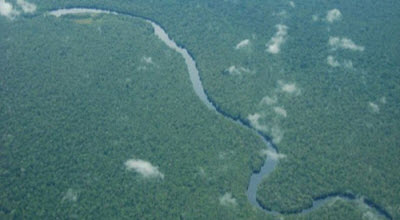
The DRC has half of Africa’s forests and water resources, but faces alarming rates of deforestation, species depletion, heavy metal pollution and land degradation from mining, according to the study entitled ‘Post-Conflict Environmental Assessment of the DRC’ and jointly carried out by the UN Environment Programme (UNEP) and the Government.
The country also faces an acute drinking water crisis which has left an estimated 51 million Congolese without access to potable water, the two-year assessment today in Kinshasa, by UNEP’s Executive Director, Achim Steiner, and DRC’s Environment Minister, José Endundo, shows.
Prepared by the Ministry of Environment, Nature Conservation and Tourism and UNEP, the study highlights successful initiatives and identifies strategic opportunities to restore livelihoods, promote good governance and support the sustainability of the DRC’s post-conflict economic reconstruction and reinforce ongoing peace consolidation.
It also notes that most of the DRC’s environmental degradation is reversible and that there has been substantial progress in strengthening environmental governance.
For example, through steps such as regular anti-poaching patrols, the Congolese Wildlife Authority has secured the Virunga National Park, which at the peak of the DRC’s crisis was losing the equivalent of 89 hectares of forest each day due to illegal wood harvesting.
However, the country’s rapidly growing population, currently estimated at nearly 70 million, most of whom depend on natural resources for their survival, and intense international competition for raw materials are adding to the multiple pressures on the DRC’s natural resource base.
Some of the key findings include the fact that DRC has the highest level of biodiversity in Africa, yet 190 species are classified as critically endangered, endangered or vulnerable. Elephants and mountain gorillas are among the species under threat.
Up to 1.7 million tons of bush meat – mainly antelope, duiker, monkey and wild boar – are harvested annually from unregulated hunting and poaching, contributing to species depletion.
The DRC’s tropical rainforests extend over 1.55 million squire kilometres and account for more than half of Africa’s forest resources – making them a critical global ecosystem “service provider” and a potential source of up to $900 million in annual revenue up to 2030.
The country also has the largest artisanal mining workforce in the world, estimated at about 2 million people, but a lack of controls have led to land degradation and pollution. Its untapped mineral reserves are of global importance and are estimated to be worth $24 trillion.
Around 15 tons of mercury are used annually in the DRC’s artisanal gold-mining operations, making it the second largest source of mercury emissions in Africa.
The assessment recommends a transition to a “green economy” with sustainable reconstruction, including capitalizing the country’s emerging social economy to generate “green jobs” and other employment, including for former combatants.
It also underlines the need to diversify energy sources as a basis for restarting economic activity. The DRC has a hydropower potential of 100,000 megawatts – or 13 per cent of the world’s hydropower potential – which could meet domestic needs and generate export revenue from the sale of electricity.
To overcome the considerable environmental liabilities of a century of mining, the study recommends immediate action to deal with mining pollution in Katanga province in the south by introducing a new, modern mining approach and formalizing the artisanal mining sector to introduce better environmental and occupational health standards.
Related articles
- • Moise Katumbi blocked from entering DR Congo (August 3, 2018)
- • DR Congo Scores High on Growth, Lags in Poverty Reduction: IMF (October 13, 2015)
- • DRC Army Putting Pressure on FDLR (April 1, 2015)
- • Congo Improves Natural Resources Accounting (July 4, 2014)
- • At least 60 killed as train derails in Katanga province (April 23, 2014)
- • Advancing Congo Troops Take Control of Rumangabo From M23 Rebels (October 28, 2013)
- • Claims that threat to Congo Basin forest is waning are misleading (July 22, 2013)
- • M23 Rebels Kill, Rape Civilians in Eastern Congo: Human Rights Watch (July 22, 2013)
- • Deforestation Slows in Congo Basin (July 22, 2013)
- • DR Congo Eases Process for Starting a New Business (June 3, 2013)
- • Regional Leaders Sign DR Congo Peace Deal (February 24, 2013)
- • In Eastern DRC, Ex-Fighters Make a New Life With Coffee (November 5, 2012)
- • Widespread abuse of logging permits opens up Congo's forests to more destruction (October 25, 2012)
- • U.S. SEC requires company disclosures on use of DR Congo minerals (August 23, 2012)
- • U.S. and U.K. Must Tell Rwanda to Stop Supporting Rebels in DR Congo, Global Witness Says (June 29, 2012)
- • Congo Government Says Bosco Ntaganda Rebels Trained in Rwanda (June 10, 2012)
- • UN Report Accuses Rwanda of Supporting Bosco Ntaganda Rebels (May 28, 2012)
- • Kabila Names Finance Minister as New Prime Minister (April 19, 2012)
- • DR Congo Economic Growth Set to Reach An Unprecedented Seven Percent in 2013 (April 12, 2012)
- • DR Congo, IMF to Co-Host Conference on the Management of Natural Resources (March 13, 2012)
- • DR Congo's Government Resigns (March 6, 2012)
- • $70 Million in Congo Mining Revenue Untraceable, Investigators Say (March 5, 2012)
- • Opposition Supporters Step Up Attacks on Congolese Officials Abroad (February 28, 2012)
- • Kabila's Senior Advisor Katumba Mwanke Dies in Plane Crash (February 12, 2012)
- • African Rainforests Continue to Face Challenges (January 6, 2012)
- • Supreme Court Rules Joseph Kabila Won Presidential Election (December 16, 2011)
- • Kabila Leads Partial Election Results (December 3, 2011)
- • Vote Counting Underway after Mostly Peaceful Elections (November 29, 2011)
- • 32 Million Congolese Voters Set to Elect Their Leaders (November 27, 2011)
- • Candidates to Make Last Stand in Kinshasa before Monday's Election (November 26, 2011)
Tags: |








